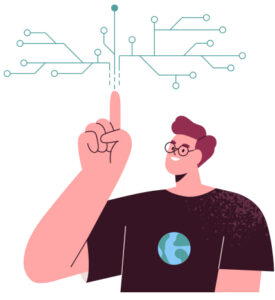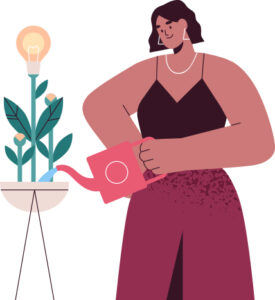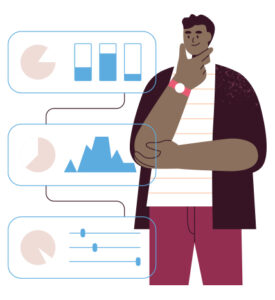A Living Laboratory
At Lafayette, problem-solving isn’t just confined to the four walls of a classroom. Students have the opportunity to apply the knowledge they gain to real-world solutions to improve the world. It’s a win-win: Students learn how to create, test, and refine ideas; those around them benefit from their contributions. Here are a few ways Lafayette students are applying their know-how to help others
IMPROVING CONNECTIONS
Assistant professor of computer science Justin Smith has embraced volunteer service ever since his grad school days, and now he imparts the importance of those deeper community connections among his students. Students in his Human Computer Interaction class worked with Landis Center for Community Engagement to connect with nonprofit organizations in Easton and across the Lehigh Valley to make improvements to their websites. Their collective outreach helped Easton Hunger Coalition, ProJeCt of Easton, Salvation Army, Second Harvest Food Bank, and Community Action Committee of Lehigh Valley more effectively reach their constituents and improve services that help those in need.
 Smith’s students appreciated the opportunities presented in his class and during a time with limited contact with the outside world. “Prof. Smith’s HCI course was incredible,” says Jamie Monteleone ’21, whose group worked with The Seed Farm, which helps train, finance, and support aspiring local farmers. “He was able to create a meaningful project that allowed his students to apply the design principles being taught in the classroom, as well as help out some great local organizations.”
Smith’s students appreciated the opportunities presented in his class and during a time with limited contact with the outside world. “Prof. Smith’s HCI course was incredible,” says Jamie Monteleone ’21, whose group worked with The Seed Farm, which helps train, finance, and support aspiring local farmers. “He was able to create a meaningful project that allowed his students to apply the design principles being taught in the classroom, as well as help out some great local organizations.”
Smith says it’s essential, especially in a 400-level course, for students to see how their work can be applied in the real world. It expands critical thinking skills in unique ways and moves students beyond simulations and theoretical scenarios, he notes.
PROMOTING INCLUSIVITY
As part of their capstone course, 18 environmental science and studies seniors applied knowledge from their coursework to create recommendations for faculty to make their own program more diverse and inclusive.
 Students worked in groups to develop several recommendations to improve the program for future generations. Among those ideas was an environmental student mentoring program to better support peers within the major. The idea, which was developed and pitched by Oscar Estrella ’21, Kendall Redlitz ’21, Sarah Shannon ’21, Bridget Wood ’21, Kathryn Kavanagh ’21, and Clennie Murphy ’21 is already gaining traction: Estrella plans to continue development on the program by working on it for further academic credit this spring. “The mentorship program is a great way to connect students on campus and have them feel supported,” Estrella says. Research has shown that peer-to-peer mentorship programs can help improve well-being and engagement, especially for women, people of color, and other underrepresented groups.
Students worked in groups to develop several recommendations to improve the program for future generations. Among those ideas was an environmental student mentoring program to better support peers within the major. The idea, which was developed and pitched by Oscar Estrella ’21, Kendall Redlitz ’21, Sarah Shannon ’21, Bridget Wood ’21, Kathryn Kavanagh ’21, and Clennie Murphy ’21 is already gaining traction: Estrella plans to continue development on the program by working on it for further academic credit this spring. “The mentorship program is a great way to connect students on campus and have them feel supported,” Estrella says. Research has shown that peer-to-peer mentorship programs can help improve well-being and engagement, especially for women, people of color, and other underrepresented groups.
“The environmental movement took a very prominent stance on racial injustice. We see in the world around us that environmental groups are becoming more engaged in social justice writ large,” says Andrea Armstrong, assistant professor of environmental science and studies, who co-taught the course with Delicia Nahman, director of sustainability. “Emphasizing that for our students, and that interconnection through this project, was very important.”
HELPING LOCAL BUSINESSES
The Dyer Center for Innovation and Entrepreneurship provides students with the opportunity to participate in experiential learning opportunities that benefit surrounding communities and businesses.
 Through the Center, Riley Larson ’21, Sarah Smith ’24, and Michael Anekwe ’22 put together a marketing campaign for the Lafayette Easton Alliance, which aims to bridge the College and Easton retail communities by encouraging shopping small, establishing special offers, and helping businesses expand their shipping capacities. During their presentation, they expressed their goals to “integrate Lafayette students into the Easton consumer market in order to deepen the connection between Lafayette and the city. We’ve seen a lot of small businesses not being able to survive [during the pandemic], and we made it our mission to help those businesses. When students [are on campus for] the spring semester, we hope to encourage them to explore not just the restaurants, but all businesses. Being here for four years, it makes sense for students to feel a sense of belonging to the city that we all live in.
Through the Center, Riley Larson ’21, Sarah Smith ’24, and Michael Anekwe ’22 put together a marketing campaign for the Lafayette Easton Alliance, which aims to bridge the College and Easton retail communities by encouraging shopping small, establishing special offers, and helping businesses expand their shipping capacities. During their presentation, they expressed their goals to “integrate Lafayette students into the Easton consumer market in order to deepen the connection between Lafayette and the city. We’ve seen a lot of small businesses not being able to survive [during the pandemic], and we made it our mission to help those businesses. When students [are on campus for] the spring semester, we hope to encourage them to explore not just the restaurants, but all businesses. Being here for four years, it makes sense for students to feel a sense of belonging to the city that we all live in.
As part of another Dyer-supported initiative, Maksym Turkot ’24 is working on developing a customer relationship management (CRM) system for the Real Estate Lab in Allentown, a makerspace for real estate entrepreneurship and investing that offers 10-week courses providing a comprehensive overview of the essentials of real estate investment and property management.
“The CRM is a course management web application that will allow the Real Estate Lab to effectively manage cohorts of students. It will automate simple tasks such as GPA calculation and will be a single place for students and instructors to access all relevant documents and assignments. And in the future, it will cover the admissions process by handling the applications,” shared Turkot, who had to study data modeling to effectively distribute how the application would handle information.